Transform your tea ritual with these seven powerful Ayurvedic ingredients. Turmeric, the golden spice, offers anti-inflammatory benefits and supports digestive health. Ginger aids digestion and reduces bloating. Ashwagandha, a stress-busting adaptogen, helps balance mood and improve sleep. Holy basil enhances cognitive function and boosts immunity. Cardamom acts as a natural mood enhancer and circulation booster. Cinnamon regulates blood sugar and supports metabolism. Licorice root provides natural sweetness while soothing digestive issues. Each ingredient brings unique flavors and wellness properties to your cup. Discover how these ancient remedies can elevate your daily tea experience and overall well-being.
Turmeric: Golden Healing Spice
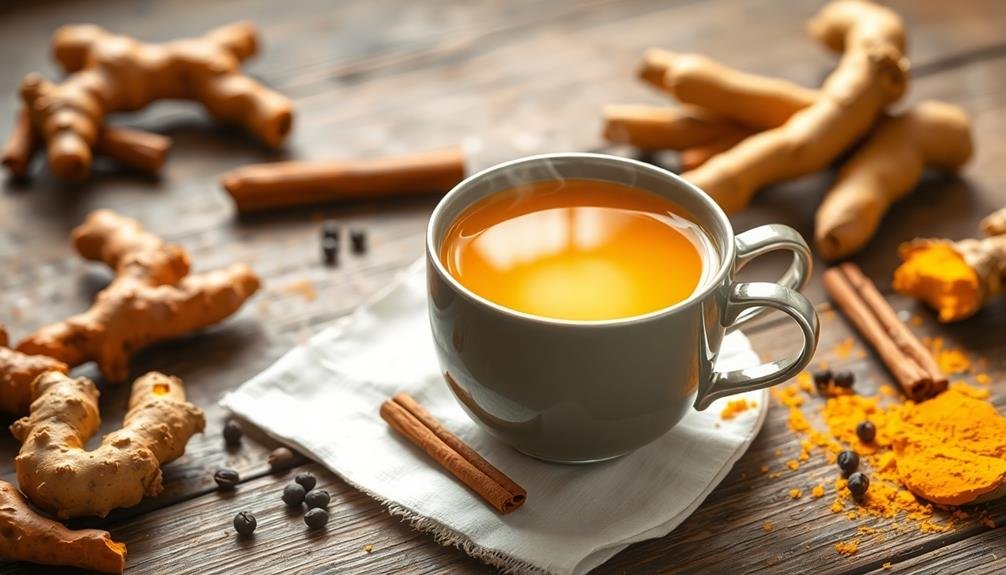
A golden treasure in the world of Ayurveda, turmeric has earned its reputation as a powerful healing spice. Its active compound, curcumin, boasts impressive anti-inflammatory and antioxidant properties. When you add turmeric to your tea, you're not just enhancing its flavor; you're revealing a host of potential health benefits.
Turmeric tea can support your digestive system, potentially easing bloating and gas. It may also boost your immune function, helping you ward off common illnesses. If you're dealing with joint pain or arthritis, turmeric's anti-inflammatory effects could offer some relief. Some studies suggest it might even improve brain function and lower the risk of heart disease.
To make turmeric tea, simply add a quarter teaspoon of ground turmeric to hot water. For better absorption, include a pinch of black pepper, which enhances curcumin's bioavailability. You can also mix turmeric with other Ayurvedic ingredients like ginger, cinnamon, or honey for added benefits and flavor.
Ginger: Warming Digestive Aid
Ginger, a potent Ayurvedic ingredient, can ignite your digestive fire and enhance your body's ability to process food.
You'll find that this warming root not only aids digestion but also possesses powerful anti-inflammatory properties.
Digestive Fire Booster
Kicking off our exploration of digestive fire boosters, we'll immerse ourselves in the potent properties of ginger. This root has been revered in Ayurveda for centuries due to its ability to stoke the digestive fire, or "agni." When you consume ginger, you're not just adding flavor to your tea; you're igniting your body's natural digestive processes.
Ginger's warming nature helps stimulate the production of digestive juices, enzymes, and bile, which are essential for breaking down food efficiently. You'll find that incorporating ginger into your tea routine can help alleviate common digestive issues like bloating, gas, and indigestion. It's particularly effective when consumed before or after meals.
Beyond digestion, ginger boasts anti-inflammatory and antioxidant properties. These qualities support overall gut health and can help reduce nausea and motion sickness.
To harness ginger's full potential, try steeping fresh ginger slices in hot water or adding dried ginger powder to your favorite tea blend. You'll not only enhance your tea's flavor profile but also give your digestive system a powerful, natural boost.
Anti-Inflammatory Properties
Inflammation, a silent enemy of our well-being, meets its match in ginger's potent properties. This warming root has been used for centuries in Ayurvedic medicine to combat various inflammatory conditions. When you incorporate ginger into your tea ritual, you're tapping into its natural ability to reduce inflammation throughout your body.
Ginger's anti-inflammatory effects stem from its active compounds, particularly gingerols and shogaols. These powerful substances work to inhibit the production of inflammatory markers in your body, potentially easing symptoms associated with chronic inflammation. By sipping on ginger tea regularly, you're giving your body a natural boost in fighting inflammation-related issues.
Here's how ginger can help you combat inflammation:
- Reduces joint pain and stiffness
- Eases muscle soreness after exercise
- Soothes digestive tract inflammation
- Supports overall immune function
- May help lower risk of chronic diseases
To reap these benefits, try steeping fresh ginger slices in hot water for 5-10 minutes. You can also add a pinch of turmeric, another potent anti-inflammatory spice, to enhance the tea's effects.
Ashwagandha: Stress-Busting Adaptogen
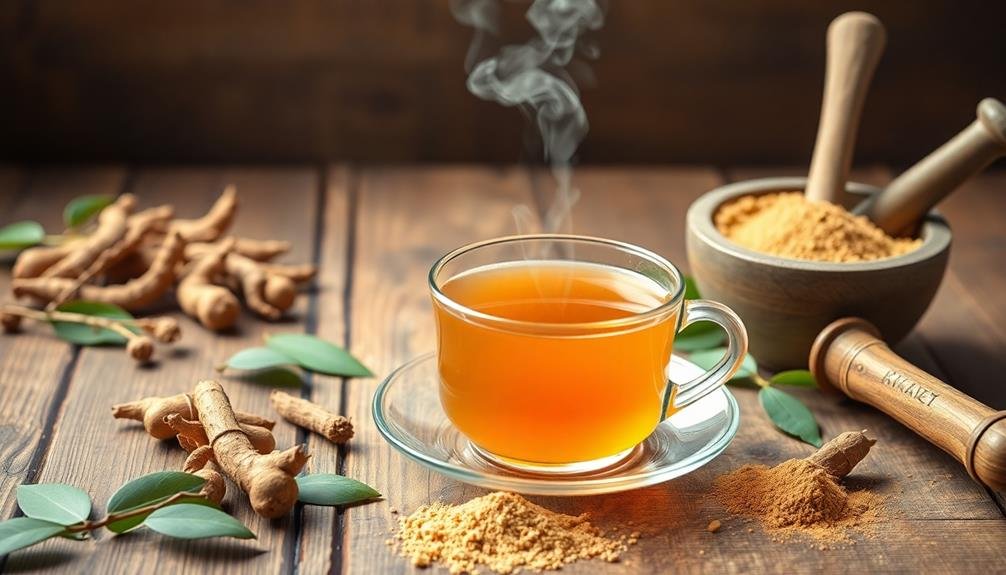
Ashwagandha, a powerful adaptogen, can greatly reduce your stress and anxiety levels when consumed as tea.
You'll find this herb particularly effective in promoting calmness and improving your overall mood.
To reap its benefits, steep 1-2 teaspoons of ashwagandha root powder in hot water for 10-15 minutes, and enjoy this soothing beverage once or twice daily.
Benefits for Anxiety Relief
While many turn to prescription medications for anxiety relief, Ashwagandha offers a natural alternative rooted in Ayurvedic tradition. This powerful adaptogen has been used for centuries to help manage stress and anxiety symptoms.
When you incorporate Ashwagandha into your tea ritual, you're tapping into its potential to calm your nervous system and promote a sense of well-being.
Ashwagandha's anxiety-relieving benefits include:
- Reducing cortisol levels, the body's primary stress hormone
- Improving sleep quality and duration
- Enhancing mood and emotional stability
- Decreasing symptoms of social anxiety
- Supporting cognitive function and mental clarity
Preparation and Dosage
To harness the stress-busting power of Ashwagandha in your tea, proper preparation and dosage are key. Start by purchasing high-quality Ashwagandha root powder from a reputable source. For a single serving, use 1/4 to 1/2 teaspoon of the powder.
Boil 8 ounces of water and let it cool slightly before adding the Ashwagandha powder. Steep for 5-10 minutes, then strain the tea into your cup.
You can enhance the flavor by adding honey, lemon, or cinnamon. For maximum benefits, drink Ashwagandha tea once or twice daily, preferably in the morning and evening. It's best to consume it on an empty stomach or at least 30 minutes before meals.
Begin with a lower dose and gradually increase it over time to assess your tolerance. Most people find 300-500 mg of Ashwagandha extract per day effective, but this can vary based on individual needs. If you're using whole root powder, aim for 1-2 grams daily.
Always consult with a healthcare professional before starting any new herbal regimen, especially if you're pregnant, nursing, or taking medications. Consistency is key, so incorporate Ashwagandha tea into your daily routine for ideal results.
Holy Basil: Sacred Balancing Herb
Holy basil, also known as tulsi, stands as one of Ayurveda's most revered herbs. This sacred plant has been cherished for centuries due to its powerful adaptogenic properties, helping your body cope with stress and maintain balance.
When you add holy basil to your tea, you're tapping into a wealth of potential health benefits.
Holy basil's unique combination of compounds can support your overall well-being in numerous ways:
- Reduces stress and anxiety
- Boosts immune function
- Improves digestive health
- Enhances cognitive performance
- Balances blood sugar levels
To incorporate holy basil into your tea ritual, simply steep 1-2 teaspoons of dried leaves in hot water for 5-10 minutes. You can enjoy this tea up to three times daily.
The taste is mildly spicy with hints of clove and mint, making it a pleasant addition to your tea collection.
Cardamom: Aromatic Mood Enhancer
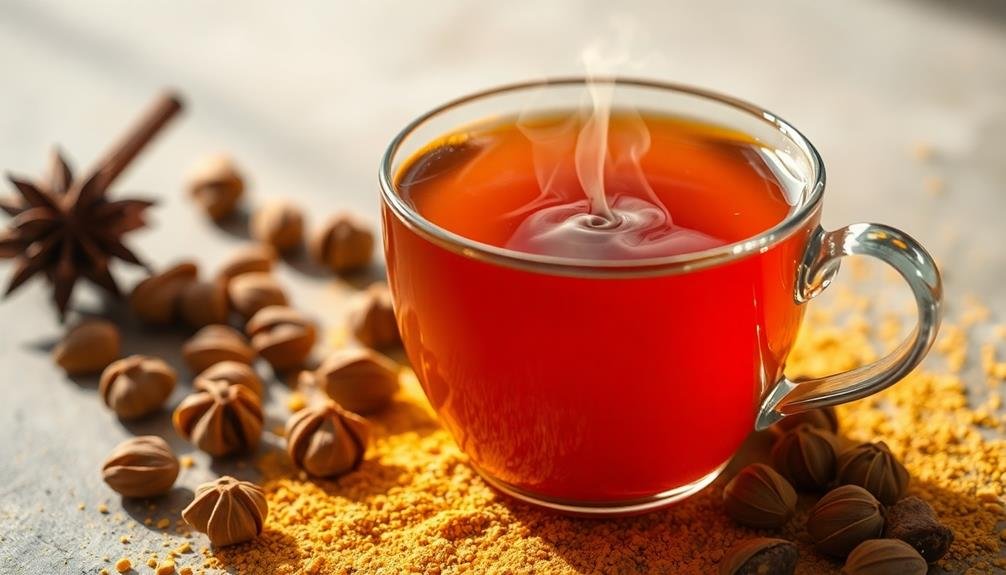
In the domain of Ayurvedic teas, cardamom reigns as a fragrant spice with mood-lifting properties. This aromatic pod, known as "elaichi" in Hindi, belongs to the ginger family and has been used for centuries in traditional medicine. You'll find cardamom's warm, sweet, and slightly spicy flavor enhances both the taste and therapeutic value of your tea.
Cardamom is classified as a sattvic spice in Ayurveda, meaning it promotes clarity and balance. It's particularly beneficial for balancing the Vata and Kapha doshas. When you add cardamom to your tea, you're not just improving its flavor; you're also supporting your digestive system, boosting your metabolism, and enhancing your mood.
This powerful spice contains compounds that can help alleviate anxiety and depression. It's also known to improve circulation, freshen breath, and even act as an aphrodisiac.
To incorporate cardamom into your tea ritual, simply crush a few pods and add them to your brew. You can pair it with other Ayurvedic ingredients like ginger or cinnamon for a more complex flavor profile and enhanced health benefits.
Cinnamon: Sweet Blood Sugar Regulator
Cinnamon, a sweet and aromatic spice, is a powerhouse ingredient in Ayurvedic tea blends, especially for those looking to regulate their blood sugar levels. This versatile spice has been used for centuries in traditional medicine and culinary applications.
When you add cinnamon to your tea, you're not just enhancing its flavor; you're also tapping into a range of potential health benefits. Research suggests that cinnamon may help lower blood sugar levels by improving insulin sensitivity. It's particularly beneficial for people with type 2 diabetes or those at risk of developing the condition.
But the benefits of cinnamon don't stop there. Here are some other reasons to include this spice in your tea:
- Boosts metabolism and aids in weight management
- Contains powerful antioxidants that fight inflammation
- May lower cholesterol and triglyceride levels
- Supports digestive health and reduces bloating
- Has antimicrobial properties that can help fight infections
To incorporate cinnamon into your tea ritual, try adding a stick or a quarter teaspoon of ground cinnamon to your favorite black, green, or herbal tea. You'll enjoy its warm, comforting flavor while reaping its potential health benefits.
Licorice Root: Natural Sweetener
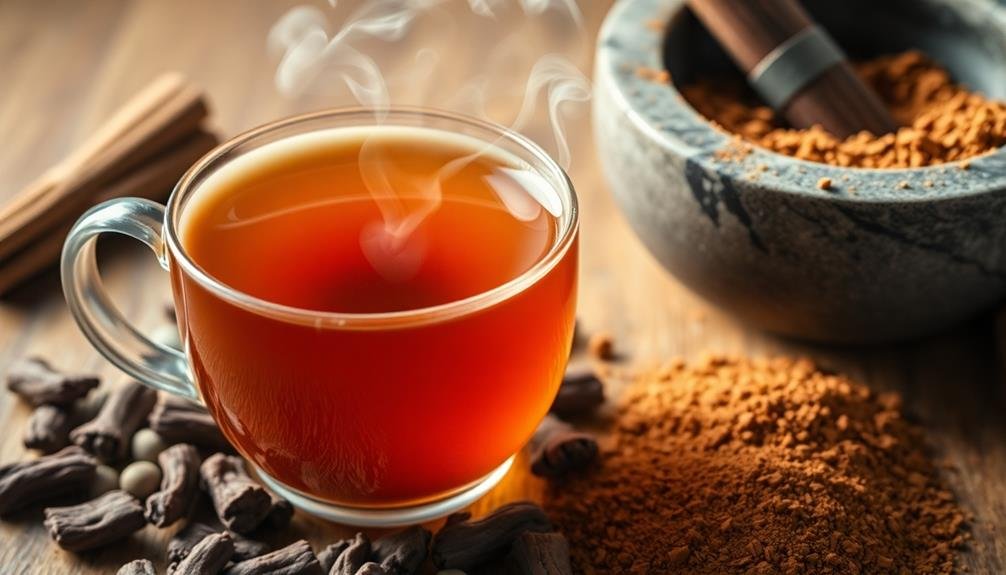
While many people associate licorice with candy, its root has been a staple in Ayurvedic medicine for centuries. As a natural sweetener, licorice root adds a distinctive flavor to your tea while offering numerous health benefits. It's about 50 times sweeter than sugar, making it an excellent alternative for those looking to reduce their sugar intake.
In Ayurveda, licorice root is known as "Yashtimadhu" and is valued for its anti-inflammatory and expectorant properties. It's particularly beneficial for soothing sore throats and calming digestive issues.
You'll find that adding licorice root to your tea can help balance your body's pH levels and support adrenal function.
However, it's important to use licorice root in moderation. Excessive consumption can lead to increased blood pressure and potassium deficiency. If you're pregnant, have heart disease, or are taking certain medications, consult your healthcare provider before incorporating licorice root into your tea routine.
To use licorice root in your tea, simply add a small piece to your brew or look for pre-made blends that include this ingredient. You'll enjoy its sweet taste and potential health benefits as part of your Ayurvedic tea ritual.
Frequently Asked Questions
How Do I Properly Store Ayurvedic Herbs to Maintain Their Potency?
To maintain potency, you'll want to store your ayurvedic herbs in airtight containers away from light, heat, and moisture. Keep them in a cool, dark place. Don't forget to label and date them for freshness.
Can I Mix Multiple Ayurvedic Ingredients in One Tea Blend?
Yes, you can mix multiple Ayurvedic ingredients in one tea blend. It's a great way to combine their benefits. However, be mindful of potential interactions and consult an Ayurvedic practitioner for personalized advice on creating effective, balanced blends.
Are There Any Potential Side Effects of Consuming Ayurvedic Teas Regularly?
While generally safe, you should be aware of potential side effects from regular ayurvedic tea consumption. You might experience digestive issues, allergic reactions, or interactions with medications. It's best to consult a healthcare professional before starting any new tea regimen.
What's the Best Time of Day to Drink Ayurvedic Teas?
You'll get the most benefits from Ayurvedic teas when you drink them at specific times. Start your day with an invigorating blend, enjoy a digestive tea after meals, and wind down with a calming brew before bed.
How Long Does It Take to See Benefits From Ayurvedic Tea Rituals?
You'll likely notice some benefits from ayurvedic tea rituals within a few weeks of consistent practice. However, it can take 2-3 months to experience more significant effects. Stay patient and maintain your routine for ideal results.
In Summary
You've now discovered seven powerful Ayurvedic ingredients to elevate your tea ritual. By incorporating these healing herbs and spices, you'll boost your overall well-being and enjoy a flavorful, therapeutic experience. Whether you're seeking stress relief, digestive support, or mood enhancement, there's an Ayurvedic option for you. Don't be afraid to experiment and combine these ingredients to create your perfect blend. Embrace the wisdom of Ayurveda and sip your way to better health.

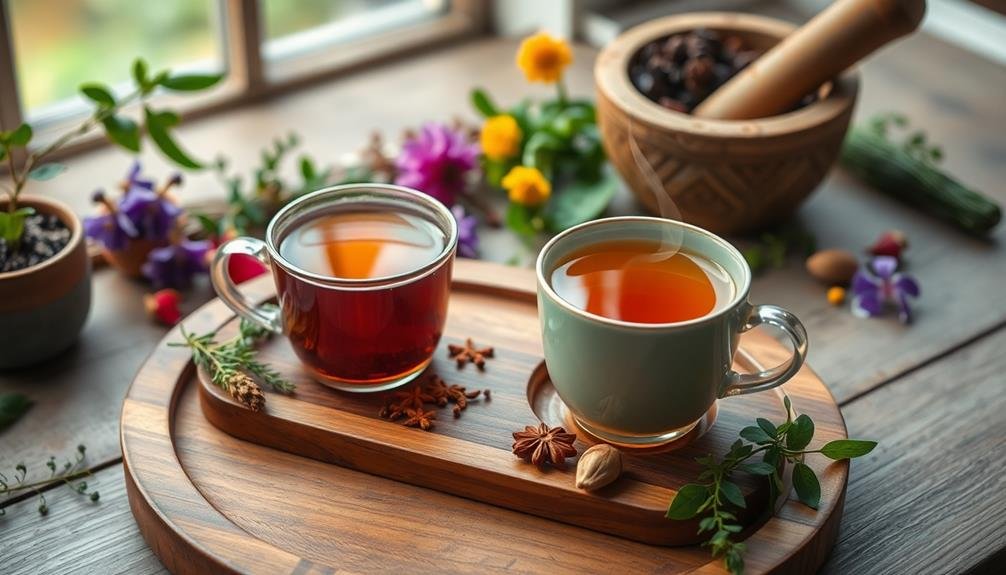

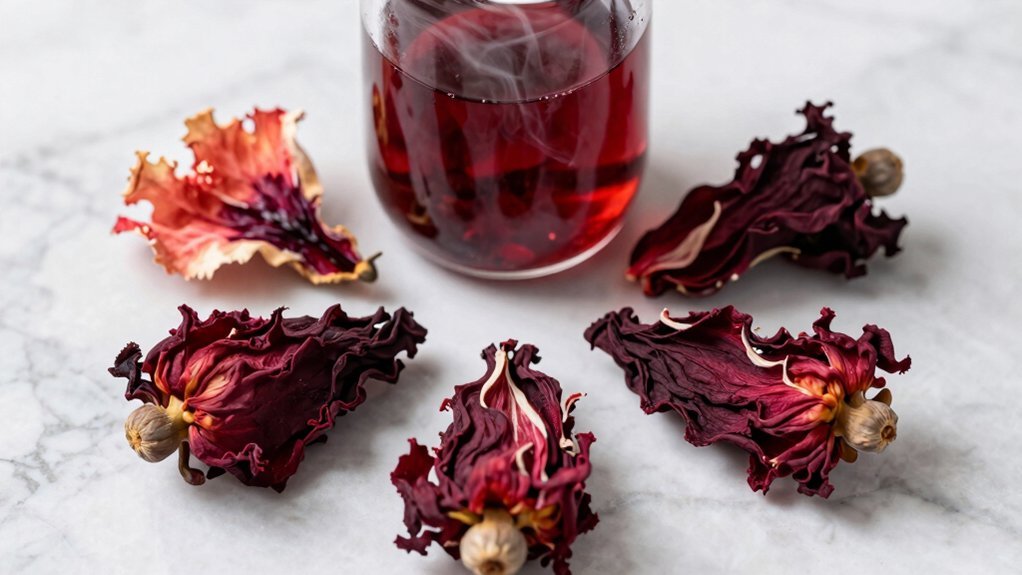

Leave a Reply